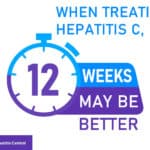Non-Compliance Lowers Hep C Treatment Success


A patient who commits to following their physician’s instructions exactly as given is a rarity. Granted, many consider their doctor to be the dispenser of God-like information. Nonetheless, a growing fear that our healthcare system over-prescribes frequently leads to a dismissal of medication directions. As such, a majority of consumers consider their prescription orders to be mere suggestions. Despite the prevalence of this mindset, there are several drugs that must be exempt from this laissez-faire attitude – including birth control pills, antibiotics, insulin and direct-acting antivirals for Hepatitis C.
Success Rates
Before the high success rates of direct-acting antivirals helped reduce the burden of Hepatitis C, the prevailing treatment regimen was pegylated interferon and ribavirin. The success rates of these medications rarely broke the 50 percent mark. The primary reason for the relatively low success rate of pegylated interferon and ribavirin was the severe side effects that interfered with patients’ ability to comply with the full dosage schedule.
Thankfully, direct-acting antiviral regimens that did not include interferon became approved in 2014. This leap forward – first with Harvoni and then with Viekira Pak – changed treatment success rates to 95 to 100% in certain populations. The new regimens that include Harvoni, Viekira Pak and several more in 2015 and 2016 have very low failure rates, yet are exceedingly costly. Thus, the additional cost of re-treatment is a substantial barrier for those with Hepatitis C who do not succeed initially.
Research at Mount Sinai Medical Center in New York
According to research carried out at Mount Sinai Medical Center in New York presented at the 2016 AASLD Liver Meeting in Boston, non-adherence was the strongest risk factor for treatment failure in people being treated for Hepatitis C.
The main reasons cited for non-adherence were:
- failing to take medications as prescribed
- and hospitalization.
The Mount Sinai study sought to explore motivational and educational barriers to adherence, such as lack of knowledge about pill-taking or the need for adherence. The researchers concluded that their findings underscore:
- the need for providers to clearly communicate dosing information
- assuring that patients have access to an uninterrupted supply of medication
- the value of pre-treatment adherence counseling
The HepCure App
In addition, the research team suggested a pill bottle monitoring system to improve adherence, and thus boost treatment success rates. As a response to their findings, the Mount Sinai Hepatitis C team developed an application for patients to assess their own readiness for treatment. Called the HepCure app, adherence reminders can be set, and communication with healthcare providers about treatment adherence, side effects and lab test results are all aimed at improving Hepatitis C treatment outcome.
Dosing Schedules Are Crucial
The information gleaned from this recent study is that the dosing schedule for Hepatitis C medications is extremely important. Different from taking a drug for pain relief only when absolutely necessary, adhering to the medication regimen with direct-acting antivirals is crucial.
Those getting ready to begin Hepatitis C treatment will get the best result when prepared to follow their physician’s instructions exactly. Use modern technology to make sure you have your next dose available at the right time. If you easily forget or dismiss strict regimens, seek support to help you stick to your medication schedule. The high cost of Hepatitis C treatment aside, get the best result possible by committing to viral elimination via adhering strictly to your medications’ instructions.
http://hcvadvocate.org/hepatitis/factsheets_pdf/Adherence.pdf, Adherence to HCV Therapy, Retrieved December 18, 2016, Hepatitis C Support Project, 2016.
http://hivandhepatitis.com/hepatitis-c/hepatitis-c-topics/hcv-treatment/5942-aasld-2016-non-adherence-is-most-important-risk-factor-for-sofosbuvirledipasvir-failure, AASLD 2016: Non-Adherence Is Most Important Risk Factor for Sofosbuvir/Ledipasvir Failure, Keith Alcom, Retrieved December 18, 2016, hivandhepatitis.com, 2016.
http://www.infohep.org/page/3101064, Non-adherence most important risk factor for sofosbuvir/ledipasvir failure, Keith Alcorn, Retrieved December 18, 2016, NAM Publications, 2016.








